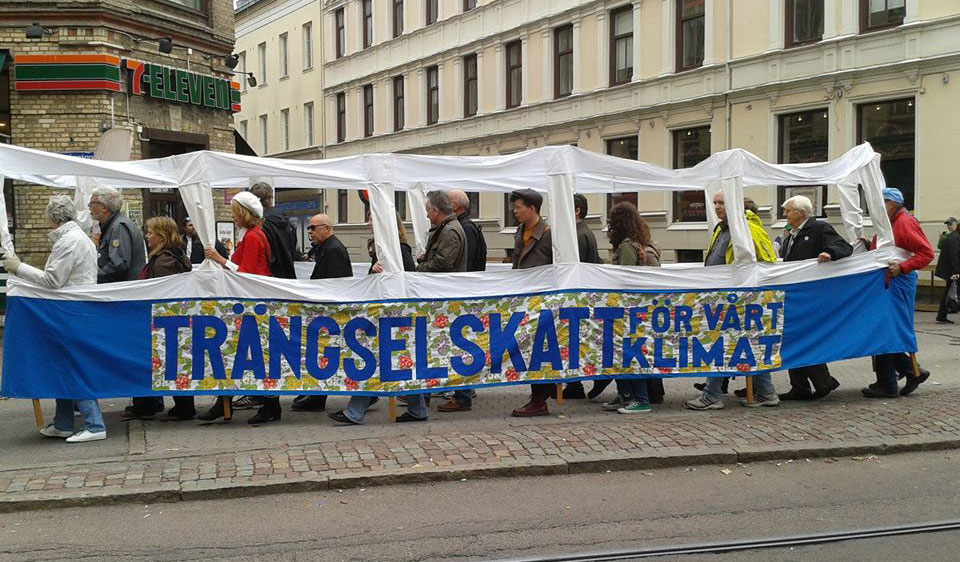Rebecka Hallencreutz, Chair person of Friends of the Earth Sweden, also active with Young Friends of the Earth Europe, reflects on the state of Swedish environmental politics.
There is this picture of Sweden as a socialist paradise that is very progressive in many fields, particluary equality and the environment (it was the first country to introduce a CO2-tax in 1991!). I hear it a lot when I´m abroad. I understand where it comes from, Sweden has a long tradition of socialism, big welfare sector, free education and healthcare and so on. But this picture of Sweden as some kind of paradise is not true of course. We are better off than most countries, I am well aware of that, I do not mean to complain. But unfortunately we are headed in the wrong direction. Like in many European countries, liberal, conservative and racist forces are growing stronger, Sweden is no exception.
Seven years ago there was a shift in power. A coalition of conservative and liberal parties formed government, the biggest party in power being the liberal-conservative “Moderaterna”. The result has been terrible in my opinion. Privatisations everywhere, growing gaps between the rich and poor (and between men and women as well), cuts, cuts and more cuts in the social welfare sector, no ambition in the environmental field, I could go on and on.
The top three things going on when it comes to Swedish environmental politics:
- Pretty much nothing.
- Greenwashing environmental politics in order to look good.
- Comtemplating about which market mechanism could solve the climate crisis.
To give a few examples:
Our environmental minister Lena Ek spends a lot of time boasting about how Sweden has been able to lower our emissions while still having economic growth. This of course has to do with the relocation of emissions. We consume products and resources extracted somewhere else, which means the emissions are the same, it just doesn´t show in Swedens emissions statistics. It´s unclear if Lena believes this mantra herself or if it´s just a dodging maneuver. How about helping those countries we import from in their transition to have a greener production? Not really, the foreign aid budget earmarked for climate related projects has been drastically cut a number of times in recent years.
The government is supporting the coal industry by not stopping the state-owned energy company Vattenfall expanding its coal-mining operations. The prime minister Fredrik Reinfelds actually approved this. When criticised he replied “I´m not the boss of Vattenfall”. Only, he is indirectly the boss, considering it´s a state-owned company.
The government is also extremely keen on passing the Transatlantic trade and invenstment partnership (TTIP), or the EU-US trade deal, which could have devastating effects on the environment, labour rights etc. You can read more about TTIP here.
Lena Ek said during her High Level Statement at the COP19 in Warsaw: “The discussion of global ambition should not only be about burden sharing and costs. It should focus more on the economic aspects of climate change – for example competitiveness and opportunities for sustainable growth”. Money talks, climate refugees and climate related deaths don´t, apparently.
The prime minister has also stated that the big emitter countries must raise their commitments before the European Union (including Sweden) should do the same…
Our finance minister Anders Borg is not a fan of trains, he said a while ago “it’s five times more important to invest in roads than in railways”, not explaining why. This has led to less money for railroad maintanance and increasing problems with rail traffic. Wierd, considering that trains are an important part of a sustainable transport sector. Sign our online action to our finance minister! Tell him to increase the budget for railroad maintanance instead of investing in highways that will increase emissions for cars. It’s in Swedish, but Google translate always works!
I wish I could write that Sweden is still a leading country when it comes to environmental work, but it is not the case. We are lagging behind in energy transition, public transport, taxes and economic incentives for a greener society to mention a few. Sure, a lot of countries are worse (like our prime minister said) but since when is that an excuse? Someone needs to take the lead and show that change is possible.
It´s election this fall. Please hold your thumbs for a better government in Sweden.

